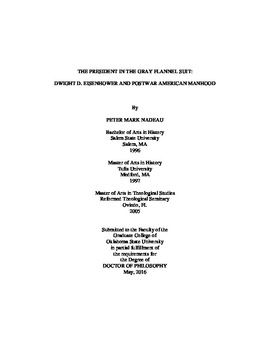| dc.contributor.advisor | Frehner, Brian | |
| dc.contributor.author | Nadeau, Peter Mark | |
| dc.date.accessioned | 2017-02-22T22:10:21Z | |
| dc.date.available | 2017-02-22T22:10:21Z | |
| dc.date.issued | 2016-05 | |
| dc.identifier.uri | https://hdl.handle.net/11244/48856 | |
| dc.description.abstract | In recent years presidential historians and men studies specialists have combined their fields of study to examine how conceptions of male identity have informed, shaped, and altered the American presidency. Dwight Eisenhower and his administration has thus far been neglected in these studies. This dissertation endeavors to examine the history of Eisenhower's construct of maleness, identified as dutiful manhood, and how that construct emerged, challenged, supplanted, and eventually surrendered to its more common construction of American male identity, identified as masculinity. | |
| dc.description.abstract | Dwight Eisenhower's conception of male identity stemmed from his small town, rural upbringing in a religious home that emphasized the virtues of duty, self-control, and maturity. This dutiful manhood was the predominant conception of manliness in nineteenth century America and was not supplanted until the contemporary conception of masculinity, denoted by virility and toughness, became popular in the nation's urban areas at the beginning of the twentieth century. Eisenhower absorbed little of the new masculinity in his persona. Rather, the tradition-bound institutions of West Point and the interwar military incubated the previous century's manhood in him and others. Whereas the Great Depression significantly weakened prevailing notions of masculinity, the Second World War rallied the masculine ethic of American males. Mass social dislocations, the horror of combat, and anxiety surrounding the nascent atomic threat, however, made a return to prewar masculinity seem reckless and dangerous. | |
| dc.description.abstract | World War II sparked a renewed interest in dutiful manhood and its postwar product bore a strong resemblance to the previous century's model. Veteran adjustment literature hastened the adoption of manly virtue on a national scale. Eisenhower's virtual draft into the presidency and his perspective on the office reinforced the necessity and popularity of manhood well into the 1950s. Yet, even as the late forties and fifties preached the duties of men, a whole bevy of new male identities emerged to challenge the supremacy of dutiful manhood and succeeded in usurping its men and the White House in the 1960s and 1970s. | |
| dc.format | application/pdf | |
| dc.language | en_US | |
| dc.rights | Copyright is held by the author who has granted the Oklahoma State University Library the non-exclusive right to share this material in its institutional repository. Contact Digital Library Services at lib-dls@okstate.edu or 405-744-9161 for the permission policy on the use, reproduction or distribution of this material. | |
| dc.title | President in the gray flannel suit: Dwight D. Eisenhower and postwar American manhood | |
| dc.contributor.committeeMember | Kinder, John | |
| dc.contributor.committeeMember | Williams, Elizabeth | |
| dc.contributor.committeeMember | Takacs, Stacy | |
| osu.filename | Nadeau_okstate_0664D_14559.pdf | |
| osu.accesstype | Open Access | |
| dc.type.genre | Dissertation | |
| dc.type.material | Text | |
| thesis.degree.discipline | History | |
| thesis.degree.grantor | Oklahoma State University | |
